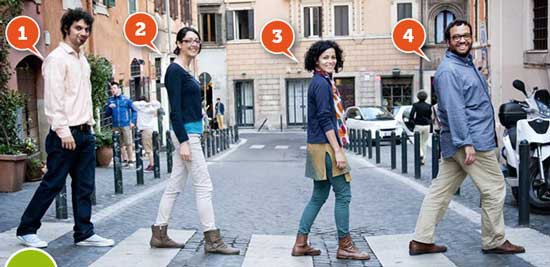As Ligabue, a very famous Italian singer whom you will get to know (and perhaps even appreciate), used to say in one of his famous songs a few years ago “si viene e si va, comunque ballando” (we come and go, however dancing). The famous Emilian singer, as a true Italian, knows how to properly use these verbs, but for a student struggling with the beginning of the study of our language it is by no means an easy task.
The difference and the correct of these terms is learnt a bit through the knowledge of some grammar and a bit through practice and habit. Conversing, talking, practicing, making mistakes, are, in fact, always key moments for the acquisition of linguistic fluency.
But let us get to know these two verbs. Both “andare” (To go) and “venire” (to come) are verbs of motion that express a movement to a place or from a place but in different directions. With a little practice you will understand that it is nothing too complicated and you will learn to use them in the right way without any blunders.
“To go” expresses the movement towards a place where the person we are talking to is not present, and it is usually followed by the preposition “a” (to): “Sai Luca, domani vado al mare” (You know Luca, tomorrow I am going to the sea) or “lunedì ho intenzione di andare al cinema” (Monday I plan to go to the cinema), “Stasera andiamo al ristorante” (Tonight we are going to a restaurant), “La scorsa estate Chiara e Lucia sono andate in Spagna” (last summer Chiara and Lucia went to Spain), “Domani io e Andrea andiamo a bere un aperitivo in centro” (Tomorrow Andrea and I will go downtown for an aperitif).
The verb “to come” indicates, instead, the movement towards the place where the person with whom you are talking to is. For example: “vengo a prenderti a casa alle 9” (I’ll come to pick you up at home at 9), “Vengo al cinema con te domani sera” (I will come to the cinema with you tomorrow night), “Vieni in pizzeria sabato?” (Are you coming to the pizzeria on Saturday?), “Elena viene alla festa domani?” (Is Elena coming to the party tomorrow? – It is implied that I will also be at the party), “La scorsa estate Luca e Paolo sono venuti in Grecia” (Last summer, Luke and Paul came to Greece – it is implied that in Greece was also who is talking), “Sabato verrò con te a cena a casa di Chiara” (Saturday I will come with you to dinner at Chiara’s place).

In Italian the verbs to come and to go are used also in some particular ways. For example, in Italian, to ask someone how he is doing, the verb to go is also used: “Come va? Va tutto bene” (How are you? Is everything well?). It is otherwise also used to express one’s agreeing with someone or something: “Mi accompagni dal dottore domani? Va bene” (Can you accompany me to the doctor tomorrow? Okay). “Vuoi studiare matematica con me oggi pomeriggio? Va bene” (Do you want to study mathematics with me this afternoon? Okay). The verb to go is also used to express a duty and a necessity: for example, “Le regole vanno rispettate” or “Le tasse vanno pagate” mean that you have to respect the rules and you have to pay taxes.
The verb to come is used, instead, in some cases as an alternative to the verb to be, as an observation and not as an obligation: “le tasse vengono pagate dalle persone oneste” (taxes are paid by people who are honest).
The verb to come is also used to indicate the place of origin if accompanied by a preposition: “Vengo dall’Inghilterra” (I come from England), “Vengo da casa mia” (I come from home).
Did we shed some light on the proper use of verbs to come and to go? Let us go and practice!


